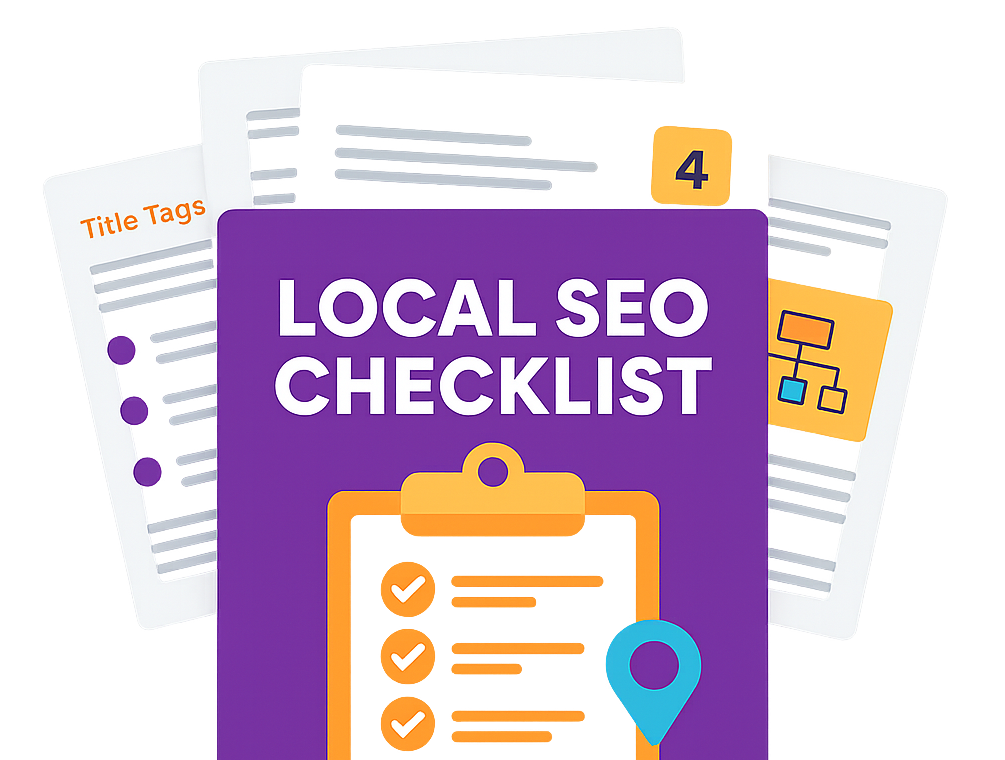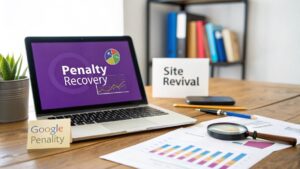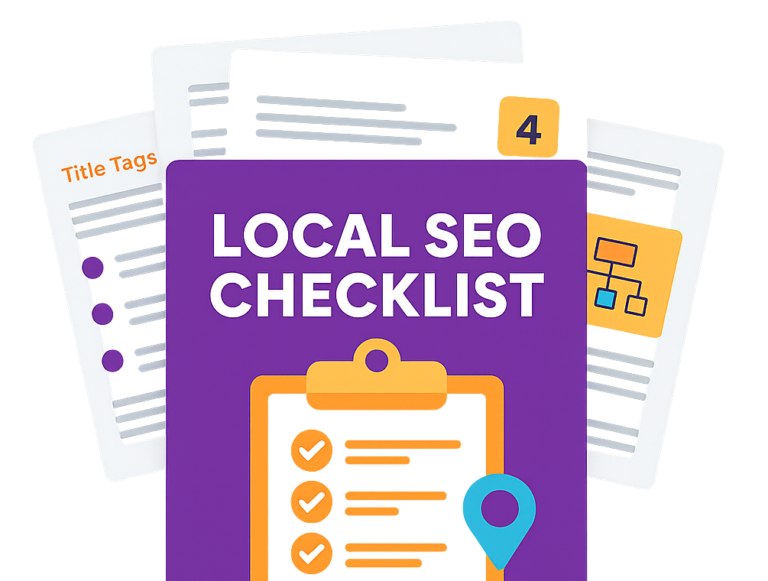Effective local SEO for accountants is all about one thing: being seen the moment a potential client in your area searches for financial services. It’s about fine-tuning your online presence so you show up in those all-important local search results, especially on Google Maps and in the "Map Pack." This is how you connect directly with individuals and businesses who are ready to hire.
Why Local SEO Is Your Firm's Best Client Magnet
Forget casting a wide net with old-school marketing and hoping for the best. Your next—and best—clients are already looking for you. They're searching for accountants right in your town, city, or county. A smart local SEO strategy cuts through the noise and puts your firm right in front of them at the exact moment they need your help. This isn't just a nice-to-have; it's the foundation of sustainable growth for any modern UK accounting practice.
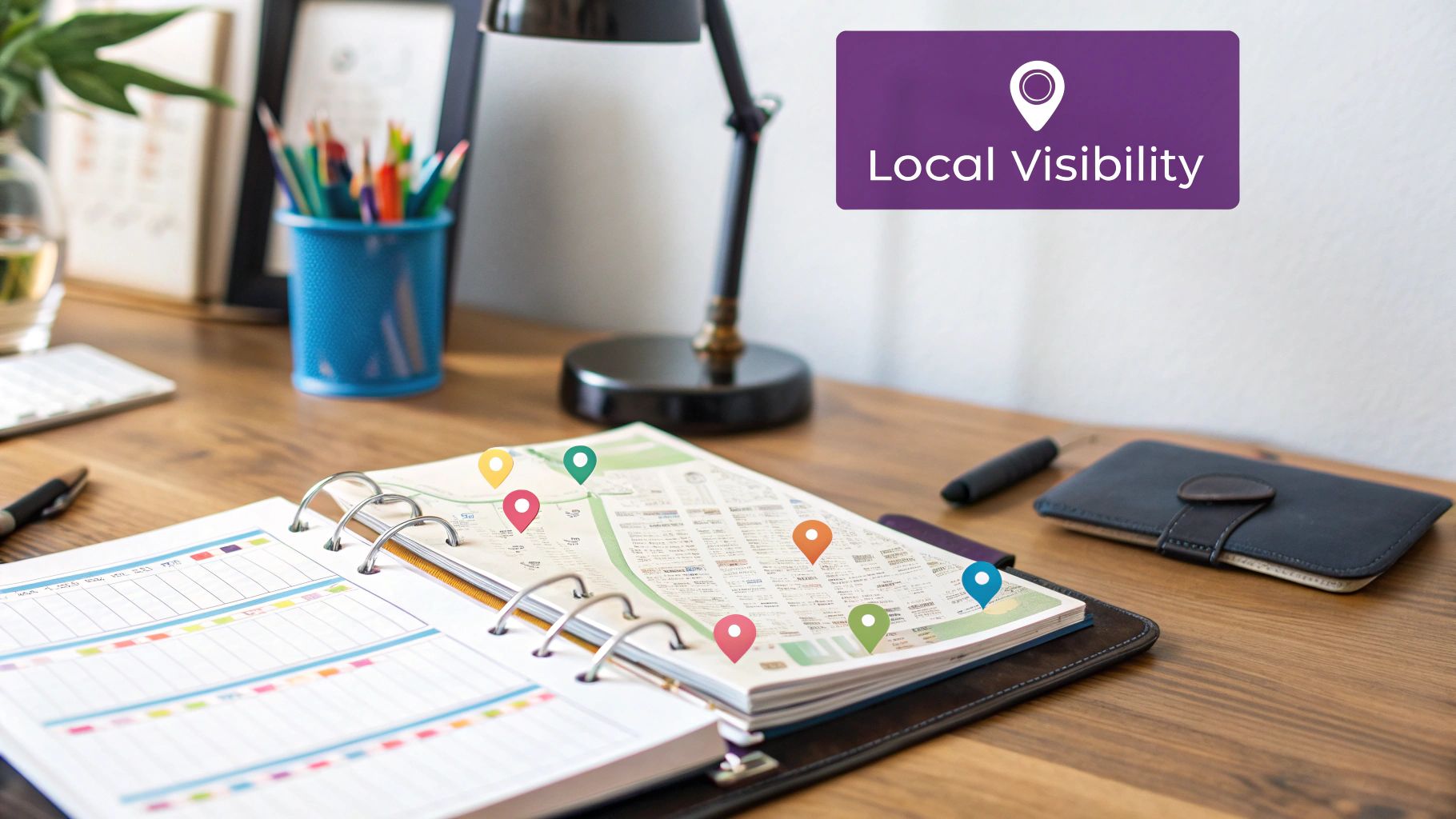
The days of relying solely on word-of-mouth are long gone. Today, the journey to finding a trusted accountant nearly always starts with a search like "chartered accountant near me" or "small business tax adviser in Cambridge." If your firm doesn’t show up for these searches, you're practically invisible to a massive pool of potential clients.
The Power of Local Search Intent
When someone searches locally, they're not just browsing. They're ready to take action. This high intent is what makes local search traffic incredibly valuable. These aren't tyre-kickers; they are people and business owners with an immediate problem, poised to pick up the phone or fill out a contact form.
The numbers don't lie. Local searches are a huge driver of web traffic, and they're only becoming more important. Data shows that local and organic searches combined generate around 69% of all digital traffic, with local queries being a major contributor to website visits. This trend makes it crystal clear: a focused local SEO strategy for your accounting firm is no longer optional.
The goal is simple: be the first and best answer when a local business owner asks Google for help. This means building an online presence that screams trustworthiness, expertise, and local relevance.
Core Pillars of Local SEO Success
Getting noticed in your local market isn't about one magic trick. It's about a combination of coordinated efforts that all work together to signal your local authority to search engines like Google.
A winning strategy is built on several key pillars:
- A Perfectly Tuned Google Business Profile: This is your digital shopfront. For many, it's the very first interaction they'll have with your firm.
- Consistent Local Citations: Getting your firm's name, address, and phone number (NAP) listed consistently across reputable UK directories is crucial for trust.
- Targeted Website Optimisation: This means weaving local keywords and information into your website's content to attract people searching in your area. Our guide on local SEO for small businesses dives deeper into this.
- A Strong Review Profile: Building a bank of positive reviews from happy clients is the ultimate social proof and a massive trust signal.
This guide will walk you through a practical blueprint for building a powerful and reliable client acquisition engine for your UK accounting practice.
Optimising Your Google Business Profile to Attract Clients
Think of your Google Business Profile (GBP) as your digital front door. For many potential clients, it’s their very first interaction with your firm. A neglected profile is like a closed door, but a well-optimised one is an open invitation, actively bringing in new business from Google Search and Maps.
Getting your Google Business Profile right is the cornerstone of local SEO success for any accountant. This free tool lets you show off vital details like your opening hours, address, phone number, and client reviews right in the search results. Snagging a spot in Google's Local 3-Pack—the top three local listings for a search—can massively boost your firm's visibility and the number of calls you get.
This section is a practical guide to turning your basic listing into a client-generating machine. It’s all about making smart choices that tell Google, and your ideal clients, exactly who you are, what you do, and why you’re the best accountant in the area.
Choosing Your Categories Wisely
The first, and arguably most important, part of GBP optimisation is picking the right categories. This single setting has a huge impact on which local searches your firm shows up for. It’s not about just picking one and forgetting about it; it’s about being precise.
Your primary category carries the most weight. It needs to reflect your firm's core service. For most, this will be ‘Chartered Accountant’ or ‘Accountant’. But if your firm has a clear specialism, you might want to consider other options.
Here are a couple of scenarios:
- A firm that mainly handles tax issues for individuals and small businesses might choose 'Tax Consultant' or 'Tax Preparation Service' as its primary category.
- A practice that focuses on bookkeeping and payroll could select ‘Bookkeeper’.
Once your primary category is locked in, you can add secondary ones. These cover your other services and help you appear in a wider variety of searches. Good secondary categories for an accounting firm could include:
- Payroll Service
- Business Management Consultant
- Financial Planner
Pro Tip: Don’t go overboard. Only pick categories that accurately describe what you actually do. Adding irrelevant ones just confuses Google and can end up hurting your rankings.
Crafting a Compelling Business Description
You’ve got 750 characters for your business description—think of it as your elevator pitch. This is your chance to tell potential clients what makes your firm special, using natural language that includes your location. Avoid just listing services; tell a bit of a story instead.
A great description for an accountant in Cambridge, for instance, might mention a focus on supporting the local tech startup scene or a specialism in agricultural accounting for nearby farms. This doesn't just slot in local keywords; it creates an instant connection with the people you want to work with. Keep it clear, concise, and focused on the needs of your ideal client.
For a deeper dive into making every part of your profile work harder for you, check out our complete guide on Google Business Profile optimisation.
The path to integrating local keywords effectively is a logical one. This diagram shows the steps from initial research right through to implementation.
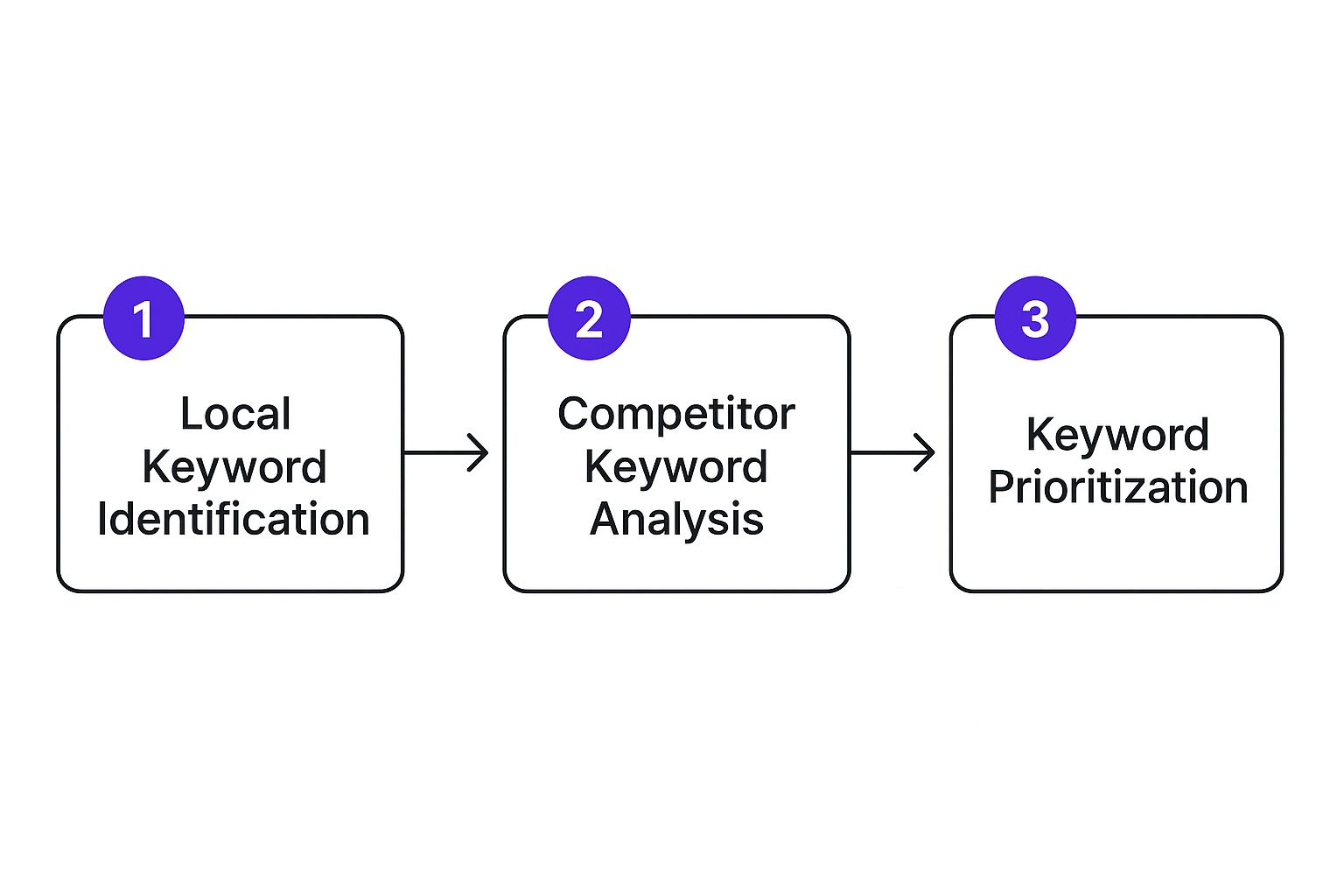
As you can see, a winning strategy starts with understanding what local clients are actually searching for, then checking out the competition before deciding which keywords to target.
Leveraging Services, Photos, and Posts
A complete profile is a trusted profile. To really stand out from other firms, you need to use all the features GBP gives you.
- List Your Services: The 'Services' tab is where you can detail exactly what you offer, complete with descriptions and even prices (£). This is brilliant for catching niche searches like 'self-assessment tax returns' or 'company formation services'. Be as specific as you can.
- Upload High-Quality Images: Photos build trust and show you’re a professional outfit. Add pictures of your office (inside and out), your team, and a high-resolution logo. Crucially, make sure your photos are geotagged with your business location's coordinates before you upload them. It’s another powerful local signal for Google.
- Use Google Posts: This feature is like a mini-blog inside your GBP listing. Use it to share firm news, promotions, tax deadline reminders, or helpful financial tips. Posting regularly signals to Google that your profile is active and well-looked-after, which can give your local ranking a nice boost.
By keeping these sections updated, you create a dynamic profile that engages potential clients and gives Google fresh information about your business.
To make sure you've covered all the bases, we've put together a handy checklist for UK accountants.
GBP Optimisation Checklist for UK Accountants
| Optimisation Area | Action Required | Impact on Local Ranking |
|---|---|---|
| Core Information | Ensure Name, Address, Phone (NAP) is 100% accurate and consistent everywhere. | High |
| Primary Category | Select the single most accurate category (e.g., 'Chartered Accountant'). | High |
| Secondary Categories | Add relevant categories for all other main services (e.g., 'Payroll Service'). | Medium |
| Service Area | Define the specific towns, cities, or postcodes you serve. | High |
| Business Description | Write a 750-character description with local keywords and your unique selling points. | Medium |
| Services Section | List all individual services with detailed descriptions and prices. | Medium |
| Photos & Videos | Upload high-quality, geotagged photos of your team, office, and logo. | Medium |
| Google Posts | Publish updates, offers, or news at least once a week to show activity. | Low-Medium |
| Reviews | Actively request reviews and respond to every single one, good or bad. | High |
| Q&A Section | Pre-populate with common questions and monitor for new client queries. | Low |
Following this checklist ensures your GBP is not just complete, but is actively working to attract local clients.
Engaging with the Q&A Section
The Questions & Answers section is a hidden gem that’s often ignored. Potential clients can ask questions directly on your profile, and anyone can answer. It's vital that you get in there first with an accurate, helpful response.
You can also get ahead of the game by populating this section yourself. Think about the most common questions you get from new clients, then post them along with clear, detailed answers. This lets you control the conversation and address common worries before a prospect even has to ask.
Building Local Trust with Reviews and Citations
In the world of accounting, trust isn't just a nice-to-have; it's everything. Once your Google Business Profile is polished, the real work begins. Now it’s time to build the kind of social proof and authority that tells potential clients—and Google—that you’re the real deal. This is where online reviews and business citations come into play, and they’re two of the most powerful tools in your local SEO toolkit.
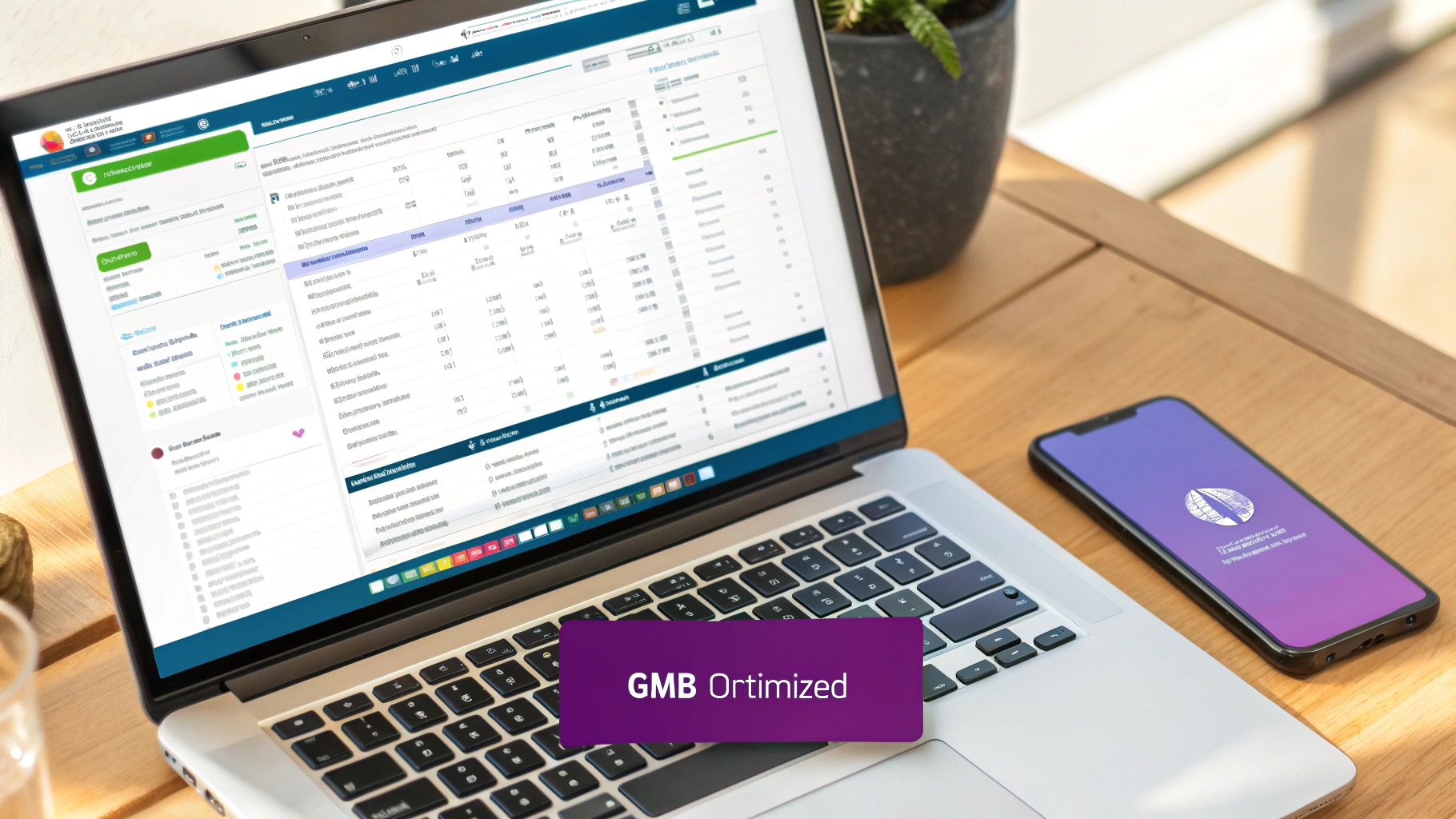
Think of these two elements working in tandem. Positive reviews are your digital word-of-mouth, showing prospects you deliver exceptional service. Consistent citations, on the other hand, are what prove to Google that your firm is a legitimate, established business right where you say you are. Nail both, and you're well on your way up the local search rankings.
The Undeniable Power of Client Reviews
Let's be honest. When was the last time you tried a new service without checking the reviews first? Your potential clients are doing exactly the same, especially when it comes to something as important as their finances. Good reviews give them the confidence they need to pick up the phone.
Client trust is massively shaped by what others say about you online. It’s not just a hunch; the numbers back it up. Research shows that 42% of UK consumers regularly check reviews before using a service, and for 37% of them, a business with less than a 4-star rating is a non-starter. With 81% of people using Google for their research, your Google Business Profile is your main stage.
So, how do you get more of those glowing reviews?
- Ask at the right moment. The best time to ask is right after a win. Did you just wrap up their year-end accounts, secure a great tax rebate, or offer some game-changing advice? That’s your window.
- Make it dead simple. Don't just ask them to "leave a review." Send a direct link to your Google review page in a follow-up email. The fewer clicks it takes, the more likely they are to do it.
- Keep it personal. A generic, automated request feels cold. A short, personalised email mentioning the specific work you did and thanking them for their business makes all the difference.
Quick tip: Make sure you respond to every single review, good or bad. Thanking people for positive feedback is great, but professionally addressing concerns in a negative review shows everyone you’re engaged and genuinely care. This public conversation can be just as powerful as the review itself.
Demystifying Citations and NAP Consistency
Beyond reviews, Google relies on another critical signal to verify your business: your NAP data. That stands for your firm’s Name, Address, and Phone Number. A citation is simply any online mention of this core information, usually in an online business directory.
Google’s web crawlers are constantly scanning for these mentions to confirm your firm is legitimate and located where you claim. The more consistent and accurate your NAP information is across reputable websites, the more Google trusts your listing. And more trust equals higher local rankings.
Even small inconsistencies can cause problems. Listing yourself as "ABC Accountants Ltd." on one site and "ABC Accountants Limited" on another, or having an old address lurking on a forgotten directory, creates confusion and can seriously hurt your SEO efforts.
Performing a Citation Audit and Building Your Profile
First things first, you need to get your house in order. A citation audit is the process of finding all the places your business is listed online and correcting any inconsistencies. You can tackle this manually by searching for your firm's name, or you can use SEO tools to speed things up.
Once you’ve tidied up your existing listings, it's time to build new, high-quality citations. Don't just go for quantity; quality is key. Focus on platforms that are well-respected and relevant to your industry.
Here’s where I’d start:
- The Big UK Directories: Think Yell, Thomson Local, and Scoot.
- Data Aggregators: These services are brilliant because they push your business information out to a huge network of other directories, saving you a ton of manual work.
- Accountancy-Specific Sites: If you’re a member of the ICAEW or ACCA, make sure your profile on their directory is complete and accurate.
- Hyper-Local Directories: Don’t forget your local Chamber of Commerce or other town-specific business directories.
Building a clean and consistent citation profile is a non-negotiable, foundational task in local SEO. If you want to dive deeper into this, our guide on the importance of local directory submissions explains how they build your online authority. A consistent approach ensures Google sees a single, trustworthy picture of your practice, no matter where it looks.
Tuning Your Website for Local Search Success
Your Google Business Profile and local citations are brilliant at pointing potential clients in the right direction, but they nearly always lead to one place: your firm’s website. This is your digital home base, the final stop where a prospect decides whether you're the right fit for them. Getting it perfectly tuned for local search is how you turn that initial interest into a phone call.
This is where on-page SEO comes in. It’s all about weaving local signals directly into your website's fabric, creating a seamless experience for both people and search engines. When Google sees your website reinforcing the same local information from your GBP and directories, its confidence in your firm goes through the roof.
Weaving Local Keywords into Your Core Pages
First things first, you need to think like a local client. They aren't just searching for an "accountant." They’re looking for a "chartered accountant in Bristol" or "small business tax advice in Manchester." Your website needs to speak their language.
Start by working these location-based keywords naturally into the most visible parts of your web pages:
- Title Tags: This is the headline in the search results and the text in the browser tab. Ditch the generic "Our Services" for something punchy like, "Accountancy Services for Businesses in Bristol."
- Meta Descriptions: Think of this as your 160-character sales pitch under the title tag. Make it count. For example: "Looking for a trusted local accountant in Bristol? We offer expert tax, payroll, and bookkeeping for small businesses."
- Page Content: The text on your pages should feel local. Phrases like, "As accountants serving the greater Manchester area…" or "We've helped hundreds of businesses across Bristol…" drive home your local focus without feeling forced.
Key Takeaway: The goal isn't to cram keywords everywhere. It’s about making it immediately obvious to a visitor—and to Google—where you operate and who you serve. That clarity builds trust and makes you far more relevant in local searches.
The Power of Dedicated Location Pages
If your firm has more than one office, even in neighbouring towns, creating separate pages for each location is a total game-changer. A single "Contact Us" page listing three addresses just can't compete with dedicated, optimised pages for each branch.
Every location page should be its own unique hub of information for that specific area. This strategy lets you target local keywords for each town with pinpoint accuracy.
For example, an accounting firm with offices in Cambridge and Ely should have:
- A page titled "Chartered Accountants in Cambridge," featuring the Cambridge address, a map, team members from that office, and testimonials from Cambridge businesses.
- A second page for "Accountancy Services in Ely," with all the corresponding local information for that office.
This simple move prevents your own pages from competing against each other in search results. Instead, you create highly relevant landing pages that are much more likely to rank when someone searches "accountant near me" while they’re in that specific town. If you want to get this right, digging into the strategy behind service area pages for SEO can give you a serious edge.
Essential On-Page Elements for Local Trust
Beyond keywords, a few on-page elements are simply non-negotiable for building local authority. These features give users and search engines the clear, practical information they're looking for.
Embed an Interactive Google Map
On your contact page and any location-specific pages, pop in an interactive Google Map showing your exact office. This is more than a convenience for visitors; it's a direct, powerful signal to Google that visually confirms your physical address.
Display Your NAP Clearly
Your firm's Name, Address, and Phone Number (NAP) should be unmissable, ideally sitting in the footer of every single page. This makes it effortless for a potential client to find your details, no matter where they are on your site. And crucially, this NAP must be an exact match to your Google Business Profile and other citations. No exceptions.
Showcase Local Client Testimonials
Social proof is incredibly powerful. Sprinkling testimonials from local clients throughout your site, especially on service and location pages, builds instant credibility. A quote from "John D., a local shop owner in Bristol" carries so much more weight for a local prospect than a generic review. It shows you're not just based in the community—you're a part of it.
Creating Content That Speaks to Your Local Market
A slick website and a five-star Google profile are great starting points, but they don't make you the automatic choice for local clients. To really cement your position, you need to be more than just another accountant on the high street. You need to become the go-to authority on financial matters in your area. The way you do that is by creating content that answers the specific, pressing questions your local community is asking.

This isn't just about attracting a bit of extra traffic. It’s about building a moat of expertise around your firm. When a potential client stumbles upon your genuinely helpful article before they even start searching for an accountant, you’ve already won half the battle. You’re no longer just a service provider; you're a trusted resource.
Finding Your Local Content Niche
The trick is to think hyper-locally. Anyone can find generic advice on "tax deductions." What they can't easily find is a detailed guide on "Navigating business rates in Manchester" or a practical checklist for "Choosing a business structure for startups in Leeds." This is where you have a massive advantage.
So, where do you find these golden content ideas? Start by simply listening. Think about the most common questions your current clients ask you day-in, day-out. Chances are, hundreds of other people in your community are typing those exact same questions into Google.
Here are a few prompts to get the ball rolling:
- Are there local council grants or tax relief schemes specific to your region? Write a simple guide on how to apply.
- Is a particular industry dominant in your town (e.g., agriculture, tech, tourism)? Create content that tackles the unique financial hurdles that sector faces.
- Have there been recent local economic developments? An article on what this means for local businesses will be incredibly relevant and timely.
This targeted approach makes your content resonate deeply with the people you actually want to work with.
By focusing on local issues, you're not just creating content; you're providing a genuine community service. This builds immense trust and positions your firm as an integral part of the local business ecosystem.
A Simple Framework for Content Ideas
Coming up with topics doesn't have to be a headache. You can use a simple formula to generate a steady stream of locally relevant ideas. Just combine a service with a location and a client type.
For example:
- Service: Self-Assessment Tax Returns
- Location: Birmingham
- Client Type: Freelance Creatives
- Resulting Blog Post Title: "A Freelancer's Guide to Nailing Your Self-Assessment in Birmingham"
Or how about this one:
- Service: Business Payroll Management
- Location: Bristol
- Client Type: Independent Retailers
- Resulting Blog Post Title: "Common Payroll Pitfalls for Bristol's Indie Retailers (and How to Avoid Them)"
This method immediately pulls you away from bland, generic topics and helps you create super-specific, valuable content that performs well in local searches.
Promoting Your Content in the Community
Writing brilliant content is one thing; getting it in front of the right people is another. To get the most mileage out of your articles, you need to think beyond your own website and tap into the local digital channels where your audience already spends their time.
Here are a few effective ways to get your content out there:
- Local LinkedIn Groups: Share your articles in business groups for your city or county. But don't just drop a link and run. Start a conversation by asking a question related to your article's topic to spark engagement.
- Community Forums: Platforms like local subreddits or neighbourhood forums can be great places to share helpful advice. Offer a snippet of value and then link back to your full article for those who want to learn more.
- Collaborate with Other Local Businesses: Why not partner with a local solicitor or business consultant? You can share each other's content with your respective audiences, providing value to everyone involved and building strong local relationships.
This kind of proactive promotion helps establish you as an active, helpful expert within your community. It drives not only traffic but also valuable local backlinks, which is a crucial part of any successful local SEO for accountants strategy.
Answering Your Local SEO Questions
Even with a solid plan, a few questions always pop up when you're getting started with local SEO. Let's tackle some of the most common ones we hear from UK accountants, so you can move forward with confidence.
How Long Does Local SEO Take to Show Results?
This is the big one, isn't it? The honest answer is that local SEO is a marathon, not a sprint. It’s about building momentum over time.
While you might see some quick wins from a well-optimised Google Business Profile in just a few weeks, the real, lasting impact comes from consistent effort. You should start seeing tangible improvements in your local rankings—and more importantly, in client enquiries—within three to six months. Activities like earning a steady stream of reviews and creating genuinely useful local content are what build that long-term authority.
Think of it as a continuous marketing activity, not a one-off project. The effects compound, gathering strength the longer you stick with it.
Key Takeaway: Patience and consistency are your best friends in local SEO. The compounding effect of your efforts over several months is what locks in your position in local search results and drives significant growth.
Do I Need a Physical Office to Rank Locally?
For a top spot in Google's coveted Map Pack, a verifiable physical address in your target area is pretty much non-negotiable. Google’s entire system is built on proximity and legitimacy, and nothing signals that better than a real office.
If you run a service-area business and visit clients at their premises, you can hide your address on your Google Business Profile. You'll still need to define your specific service area, like by postcodes or towns. But be realistic—trying to compete for rankings in a city where you have no physical presence is an uphill battle. The algorithm is designed to favour businesses with a genuine local footprint.
Should I Pay for Listings in UK Local Directories?
Your first move should always be to claim the free listings on the big, authoritative UK directories. Getting your details right on platforms like Yell, Thomson Local, and other key business indexes gives you high-value citations without costing a penny.
Some paid directories will promise extra features or a more prominent listing, but your budget is often better spent elsewhere. Investing in creating quality local content for your blog or getting professional photos taken for your website will almost always deliver a better return. Look at any paid opportunities on a case-by-case basis, but never at the expense of locking down the free, authoritative directories first.
How Should I Respond to a Negative Google Review?
Getting a negative review can feel like a punch to the gut, but how you handle it in public is what really matters. The key is to respond quickly and professionally.
Your response needs to do three things:
- Acknowledge their concern. Show you’ve actually read their comment. A simple, "We're sorry to hear your experience didn't meet expectations" is a great start.
- Don't get into a public slanging match. Never get defensive. The goal is to show other potential clients that you take feedback seriously and want to put things right.
- Take it offline. Offer a direct line to resolve the issue privately. Something like, "Please contact our office manager directly at [email/phone] so we can look into this and find a solution."
Never, ever ignore negative feedback. And for reviews that are clearly spam or violate Google's policies, you can flag them for removal—but a calm, professional public response should always be your immediate first step.
Ready to stop wondering and start ranking? Bare Digital offers expert local SEO services designed specifically for businesses like yours. We provide a free SEO Health Check and a transparent, tailored plan to get you in front of more local clients. Find out how we can help your firm grow.


